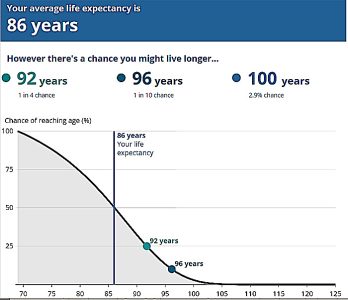
Life Expectancy
Below is an example of the result obtained with the online calculator available at the Office of National Statistics. In 2024, upon entering an age of 69 for a male, the statistics point to an average age at death as being 86 years. The same age (69) for a female gives an estimate of 88 years.

This is an improvement on the situation in past centuries, when we are led to believe that life expectancy was short. Wars, covert bioweapons, dangerous workplaces and lack of hygienic sanitation kept the elderly population numbers down until the period 1895 to 1930, when living conditions began to change.
Better medical treatments, town planning and work environments, added to the provisions of the new Welfare State post-WW2, have seen life expectancy steadily rise to the current (2024) level of 82. However, a modern tendency towards unhealthy lifestyles means that the UK is ranked in the world’s top 30, whereas it was in the top 10 in the 1950s.
Nevertheless, there have been at least 150 ‘supercentenarians’ in this country, i.e. people reaching the age of 110, and our oldest citizen in recorded history — Charlotte Hughes — was 115 years and 228 days old when she died in 1993. Her tips for a long life were healthy eating and Christian values.
(Top image: “Do you think we are getting too old for this?” by Neil Moralee at Flickr.com / CC BY-NC-ND 2.0)
